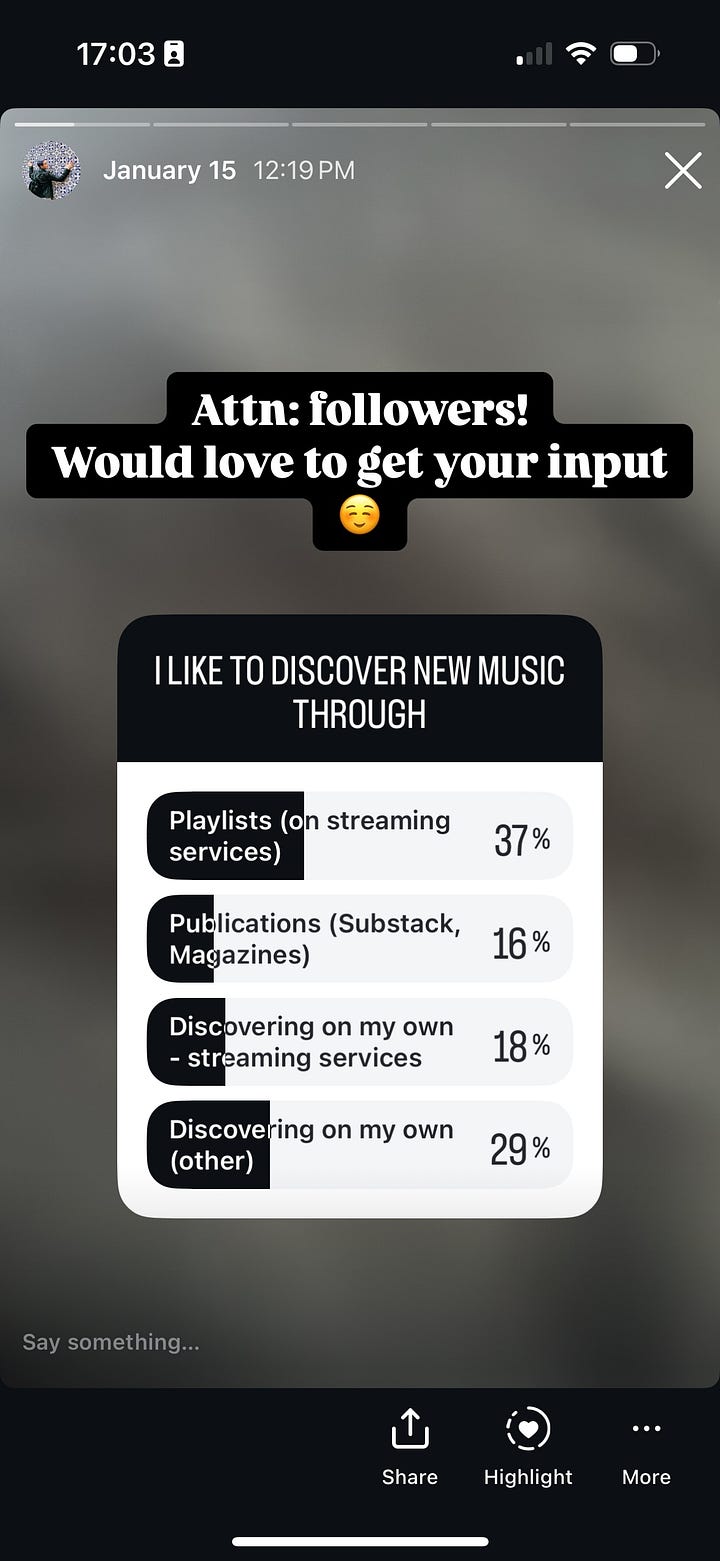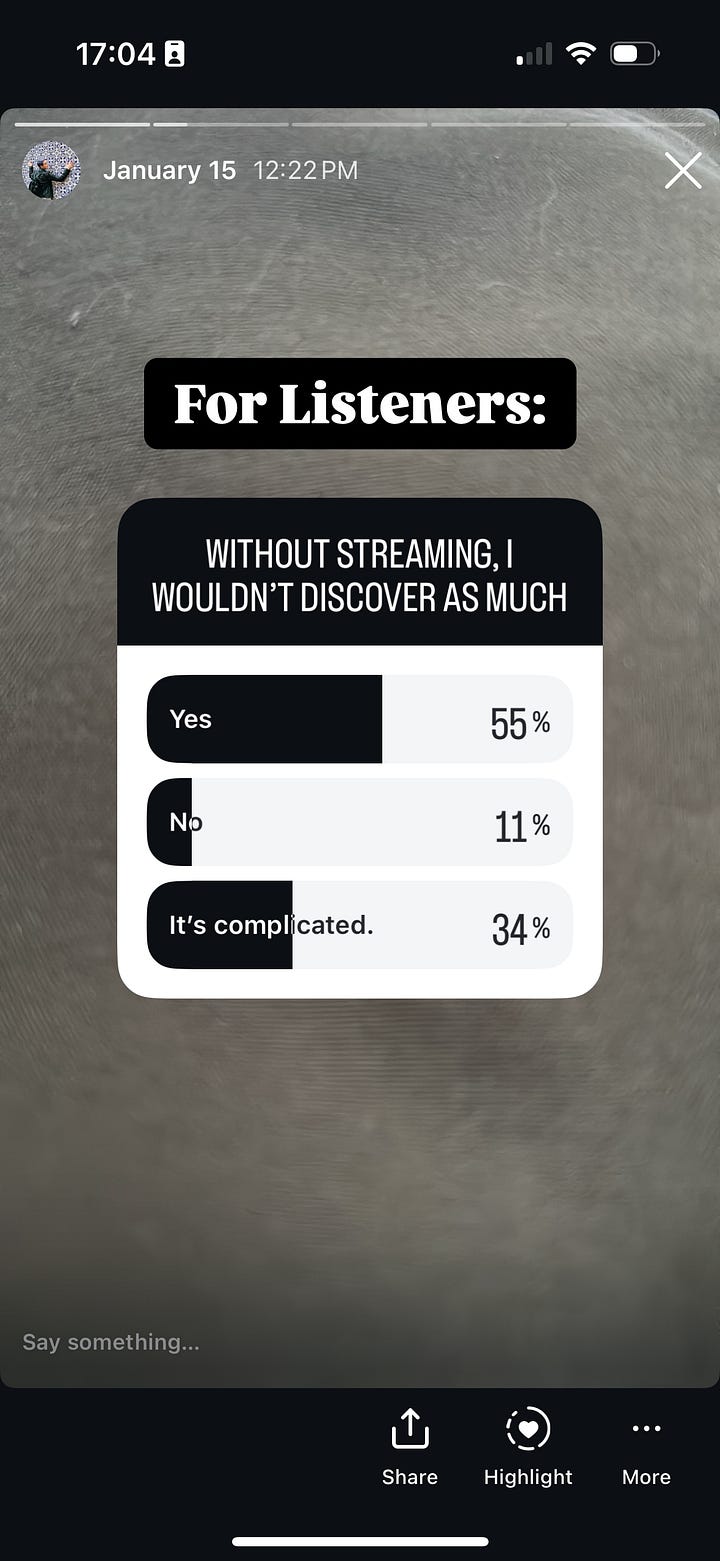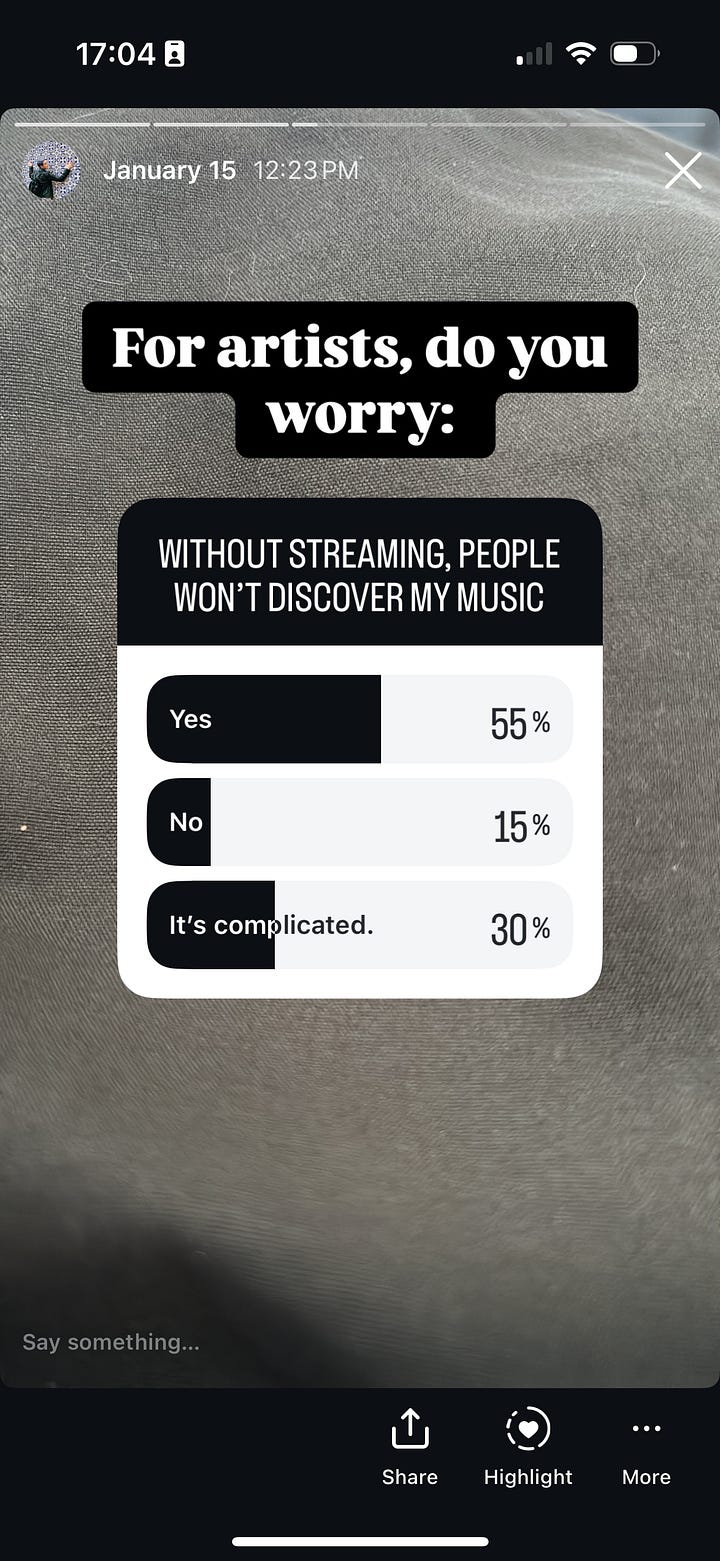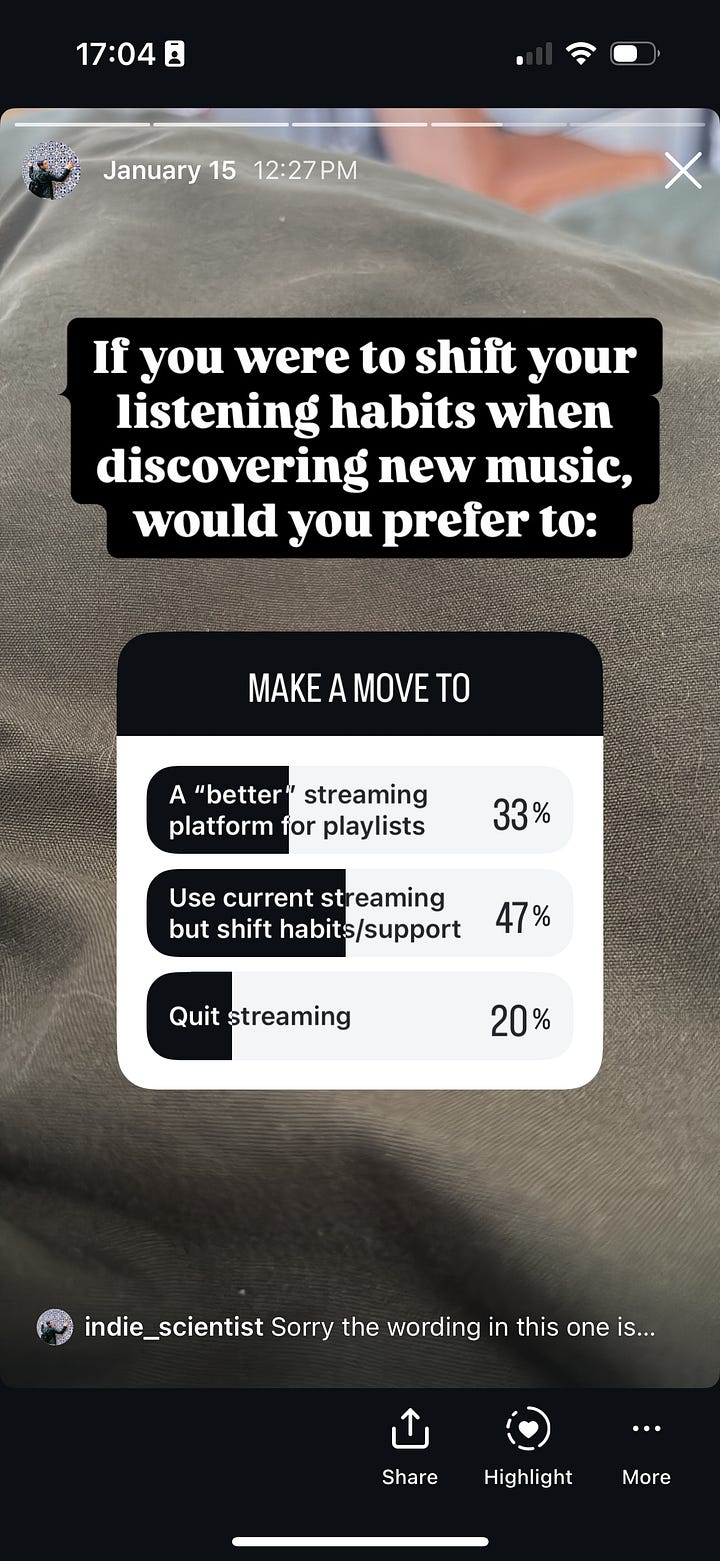To Delete Or Not To Delete? A Playlist Curator's Dilemma
Unpacking uncomfortable feelings about streaming and modern listening habits.
I felt conflicted about writing anything to add to the conversation on this. There are already tons of great articles out there with extremely valid points on the predatory aspects of streaming services like Spotify and the societal shift of how we consume music, outlying more than enough points to leave streaming services all together, or at least shift over to a better one. Some writers have also acknowledged the industry’s necessity of a streaming identity and “success” in order for artist to be promoted or even booked for shows. Will an extreme departure be harmful to emerging artists, or will the temporary setback be beneficial in the long-term goal of challenging the industry standards?
And something that personally hits home for me; how does this impact new music discovery? I’m someone who relies on streaming services (in my case, Spotify) to consume a wide array of music from around the world, particularly emerging artists, and redistributes new music releases via playlists, social media posts, and these very Substack articles. If I transitioned to a different platform, would I have the same amount of access/reach? If I transitioned off completely, how would that impact my ability to find and share artists with others?
Throughout this discourse, I’ve been stuck in this thought paralysis of “What should I do?” or “What is the right thing to do?” On one hand, I can acknowledge that my Spotify consumption habits might not be as common as the typical users, given my active discovery lens and efforts to distribute new music from artists not typically supported by the algorithm. And on the other hand, I can acknowledge that I am participating in a system that may be causing more harm or strife for DIY/independent artists. I can dizzy myself looking at all of the angles, so I’ve gone to my most foolproof remedy: mind dumping on some (virtual) paper.
I read a quote recently in Maybe You Should Talk To Someone, where the author Lori Gottlieb states, “We can't have change without loss, which is why so often people say they want change but nonetheless stay exactly the same.” We are creatures of habit, constantly sold this promise by technology giants that these services will make our lives easier, less stressful, less time consuming - and the threat of taking away these “enhancements”, whether through voluntary or involuntary means (RIP TikTok), can feel like having your toys taken away as a child.
So in the end, we often flee from these feelings of discomfort, or the level of introspection that occurs when you are told that your behaviors are not moral, not good, not beneficial, or harmful. We may tell ourselves that these things are bigger than ourselves, and that our independent contributions aren’t big enough to fight the larger systems at play, in an effort of lessening the ick. But I think that, more than often than not, we should invite ourselves to sit in those feelings of discomfort - not as a means of punishment, or self-flagellation, but as a means of a critical look at our interactions with the dynamic systems at play around us.
In an earlier life, I was an educator and researcher, focusing on media literacy and psychology. The National Association For Media Literacy Education defines media literacy as follows:
Media refers to all electronic or digital means and print or artistic visuals used to transmit messages. Literacy is the ability to encode and decode symbols and to synthesize and analyze messages. Media literacy is the ability to encode and decode the symbols transmitted via media and synthesize, analyze and produce mediated messages.
Ultimately, media literacy “empowers people to be critical thinkers and makers, effective communicators, and active citizens.” We should always have a critical lens when interacting with any form of media, especially ones propositioned by larger corporations.
Let me first note that I’m not here to declare that media, or streaming services, are inherently the “big bad.” We’ve seen popular discourse, for example, about video games - do violent video games promote violence, thus leading to more violence? There are ways of utilizing media literacy that do not erroneously assign causation or perpetuate F.U.D. tactics (fear, uncertainty, and doubt). But its important to acknowledge the patterns and messages we see in media in order to analyze and deconstruct them and ask questions around the content we are ingesting.
If we acknowledge that the majority of Spotify users are over the age of 18, then most of us should have the capacity to employ media literacy tactics in our digital lives, or have discussions with those who are younger when needed. And I think the easiest way to start with this is to conjure up those thoughts or feelings that appear when you reflect on something you are consuming. In this piece, I wanna explore some of the thought processes that I’ve gone through when evaluating my own relationship with streaming services. I invite you to take what resonates, what makes you ask your own questions, and use resources that help you inform your own relationship with music consumption in 2025.
Streaming services allow me to have the world [of music] at my fingertips.
Ah, the Internet. The world wide web, allowing us to connect with someone in another city, another country, in close to real-time, when the past may have separated us by mountains and oceans. I can spare you the analysis on the positives and negatives of this.
A reality: Spotify has allowed me to discover artists from all around the world, at all levels of “popularity.” I’ve interacted with both independent and Spotify-generated playlists that have promoted artists from other countries. It’s provided me with a centralized place to access and keep all of these artists, that works across devices.
An equal reality: There are other streaming services and Internet resources that could provide access to a large range of global artists. Yes, Spotify is one of the most popular applications, and thus many artists will upload new releases to its platform. Nevertheless, there are other places where music is uploaded and/or discussed, and many of those locations may be preferable or more beneficial to the artists. Prior to Spotify, I’d utilize music forums, blogs, and YouTube to discover new artists, even internationally. The Internet still holds great resources for discovery, and platforms like Discord, Reddit, and Substack (while still being big tech conglomerates) at least encourage discussion and digestion of new music releases.
An equal equal reality: The real, Earth version of the world wide web exists on the ground, right outside our doors. And while those real world geographical boundaries return, there may be a world of music closer to you than you think. Check out your local music scene, whether its live gigs, music shops, or community gatherings. If you’re travelling, check out their local music scene, record shops, etc! Music tourism is a really fun way to expand your horizons, and as someone who has made a ton of music friends around the world, a great way to make foreign pen pals.
Before Spotify, I totally did not participate in music piracy… at least I’m paying something now, right? Streaming services are cost-effective; for an [ever increasing] small monthly fee, I can access all the bands that I want.
Look, I get it, music can be expensive, particularly physical media. Everything is expensive nowadays, and many of us don’t have a ton of cash to float around. Currently, I have 22,500 liked songs on Spotify - the only place I currently have $22,500 is my negative balance on my student loans.
A reality: Spotify is cost-effective for the consumer, if you compare it purchasing all of the media outright. Even before streaming services, there was a push for exchanging music at preferably low to no cost, whether it be via music piracy or burning music for your friends. Given the initial mission of Spotify was to provide a legal alternative/solution to piracy; isn’t a little bit of money to the artist better than no money at all?
An equal reality: Spotify is also cost-effective for Spotify, the multi-billion dollar company that has created a system of “necessity”, taking money from both listeners and musicians, and not returning an equitable amount to the artists. Despite displaying record-breaking profits, they’ve also had a culture of layoffs in the past few years. There’s a cycle of perpetuation that keeps this system afloat, allowing them to ever increase their fees for profit, whilst still neglecting the user, artist, and employee experience.
An equal equal reality: Ultimately, you can decide where your money goes to, and no one is forcing you to purchase something. But if you’re looking for a place to redistribute the $12 you spend each month on a service like Spotify, you could look into: switching to other streaming services with more artist kickback; purchasing digital music or merch on sites like Bandcamp; buying new music releases from your favorite band’s website or a local record shop; attending concerts/festivals; supporting radio stations or paid publications; thrifting used/second-hand media…the choices are endless. And while you won’t “own everything” anymore (we don’t own our Spotify libraries anyway), your investment may go to something that you actually do own, or at least closer to an artist’s pocket. And yes, there’s potentially still avenues for accessing music without a cost somewhere on the Internet.
Streaming services don’t pay artists well.
Continuing on from the previous section - What happens to the people behind the track?
A reality: Streaming services don’t pay artists well - particularly Spotify - and specifically not well enough for them to survive on as a primary source of revenue. In many cases, artists also have to spend money to host their music on the platform as well, needing to generate large streaming margins to be profitable. There are also layered intricacies of the middle men between Spotify and the artist, including rightsholders and labels, which might obfuscate the monetary flow.
An equal reality: It is hard for me to imagine a world where a streaming service could or should be the primary income flow to artists, but the fact of the matter is that these corporations do have more profit to share and they should be held accountable to do so. But to put it simply: if we normalize streaming as our only or primary way of supporting artists, we’re not providing the best support possible. So be sure to look at more direct purchase avenues when you can. And if we are going to utilize streaming, we should encourage these corporations to distribute revenue equitably to its artists.
All my friends have streaming services; how will we share music with each other? How will I be able to catalogue my music taste to share with the masses?
What will I be if I can’t share my Spotify Wrapped at the end of the year?
A reality: Streaming services like Spotify have brought in a social aspect, where you can share music digitally with your friends, collaborate on playlists, stalk your exe’s profile, and of course, generate recaps like Spotify Wrapped that will either leaving you standing elite with your streaming numbers and “cool” taste, or leave you in minor embarrassment with Cobra Starship being your third most played artists in 2024…So let’s say the positives can be a sense of community, the share-ability, and the ease of peaking into someone’s digital record shelf.
An equal reality: This sense of community and exchange is not unique to streaming services and social media - they may have given us a convenient way of putting it in an app, but its clearly built off the backs of music-loving communities that have existed long before Instagram and Spotify. There are definitely other online communities that would facilitate these conversations and dispersion of music, including forums, newsletters, and articles. And while comment sections can be a cluster-fuck of nightmares sometimes, I’d encourage you to keep an open mind; there’s plenty of wonderful and supportive spaces and fandoms out there (and I hope this one can be too).
An equal equal reality: I’ll admit it; I love social media. I love the ease and access and being able to get to something in under two clicks. But sometimes, I need to go fucking touch grass. Leave the house, go talk to a human in real life. As a millennial, I need to constantly remind myself that I actually did have years without a smart phone and where I had to wait for dial-up and where I expected to have commercial breaks and I where I would burn CDs to share music with friends. I remember the world where that existed for me, and the reality is that a lot of this stuff still exists out there; it might not be immediate, or right at your fingertips, and it probably takes just a little more time, but it’s there.
If you’ve got the music fever, the only prescription is: more community. So go chat with some friends, strike up a conversation with some record shop employees or fellow concert-goers, and participate in the collective that surrounds you. Believe me; you’ll know that I like Cobra Starship whether I have Spotify or not.
I’m a playlist curator or someone who likes to discover independent and DIY artists; what does this mean for me? I’m supporting small artists by interacting with them and/or promoting them on streaming services, thus increasing their streams and distribution. Surely I can’t be part of the problem?
Ah yes, my conundrum. Sometimes I wonder if I was an “average” consumer, if it would be easier for me to cut ties with streaming, to revert back to the old ways and get by. But I love discovering new music, and I love sharing new music, and have really pushed myself to curate and write as a way of fulfilling my needs and helping support emerging artists. I thought I was already being anti-establishment, actively trying to combat the fallacies of streaming services through independent efforts. But are those efforts futile, and am I just another cog in the machine?
A reality: Streaming services do provide an easy way to connect with a large audience. As a user, its nice to just log onto one place and access all of the music you already like, and be able to find more music based on recommendations. As an artist, it gives you access to that large audience of users. And as a playlist curator, it let’s you be a bridge of those two demographics.
An equal reality: A one-stop shop for all things music and listeners? That makes everything seem so easy!
But to quote my favorite movie, Wet Hot American Summer, “Well, it is. But see if you can follow me here... it [long pause] ... isn't.”
As a user, you might find that things are too repetitive, or too force fed, or that the “shuffle” button actually has a pattern and you aren’t actually discovering what you want. For an artist, it’s not as easy as just uploading your music - maybe you need to ask people to pre-save so they’ll actually see the release, or so that it can generate enough traffice for the algorithm will promote it on official playlists, or you need to reach out to independent playlisters and writers to get your content out there. Even as a playlist curator, things are frustrating when you too have to garner a devoted listener ratio to levy your playlists over others with thousands of followers.
“Oh. So it is... and it isn't.”
The complicated answer is that many of us don’t want to be in the machine, but feel required to, for fear of what we may lose or fail to gain if departing the system. In fact, I took a brief little survey on Instagram while writing this and found that a majority of people felt the same; sometimes happy, but mostly reliant and conflicted.1
So what’s the solution, Indie Scientist? Will you teach me about this - what is it? A new way? [bird calls]
If you came to the end of this article expecting me to declare what decision you should make about your streaming account, I am not your mother and I can’t tell you what to do.
The reality is, I’m still figuring out what to do.
What I do suggest is reflecting upon your own relationship with and conflicting feelings about streaming, and carving out a space for curiousity and change. Don’t limit yourself with phrases like “I can’t”, especially when it might not be the full truth. Explore some different avenues, and see what it’s like to reduce, repurpose, or replace your current habits. Finding different ways to engage with music and culture beyond the first choice on the App market can only bring benefits to your interactions, especially within your immediate community, and expand your worldview of what is feasible in modern listening culture. Be agents of change, voice your opinions about violating practices, and amplify the voices of others who are also trying to shift the narrative. Support artists, support independent writers and curators, and support yourself!
The reality is, you have options. Explore them!
Or better yet, create them! What do you think would be better solutions - either online or offline? Sound off in the comments below.
Your continued support is always appreciated, and every follower counts! Thank you!









you're summing up a lot of my own thoughts on this topic. I stopped paying for Spotify but continue to use it to create playlists for all the reasons you mentioned, and I pay for Apple and Tidal (and dislike both as a user). Tidal is my main platform now and it's not one that satisfies all of my needs as a music listener OR a curator. Not even close.
The reality? I may go back to paying for Spotify (in addition to paying for the others). In my posts, I link to Bandcamp for all individual artists. Playlists I share are default Spotify with links to all the other platforms, but I may start defaulting to SoundCloud with links to all the others instead.
The fact is that I purchase music on Bandcamp and maybe more importantly, drive a ton of album sales directly on Bandcamp as well because of how much music I recommend. I get messages daily here and on TikTok/Instagram telling me "I bought so many new records because of you." So the feeling that I'm not the average user resonates, even though I know I'm not special or exempt from criticism.
I also know that (highlighting Carré's recent piece) Spotify streams are still the gold standard for determining whether labels will even work with an artist in the first place, and that's not going to change any time soon. Music discovery aside, and Spotify has always been my #1 source of excellent new music because I'm actually not being served garbage by the algorithm like many are (I guess being somebody who listens to brand new underground releases constantly has its perks), the fact is that Spotify is still the central metric for artist success. If we aren't there to help their numbers, even though their pay is abysmal if non-existent, that is screwing them over too.
My point is, nothing is actually black and white.
We can send a message with our wallets. Spotify is deplorable. There's no question. But I want to be the best curator I can possibly be, and without it, it takes me many extra hours a week to scour the best music. As somebody who is drowning from 12 hour work days 7 days a week recently to the point of mental collapse sometimes... I'm not going to beat myself up if I end up crawling back.
I'm an addict so I accept sinning in order to get my fix, and I need more and more. Craven but true. My particular jones is jazz, but everyone has their own addiction. The cost even of downloading would cut my listening by a factor of at least ten. My guilt at paying Spotify 10€/month for unlimited access to a vast ocean of music is assuaged by the fact that I regularly attend live music, I do pay for downloads and even the odd CD, and through my Substack and Facebook throw the spotlight on a lot of music, new and old, for a small but equally addicted group of readers. And need I say that I do not listen to Spotify-curated playlists. I make my own! I'll be in a pickle if and when Spotify folds, but there you have it. If all this makes me evil, then I'm evil.